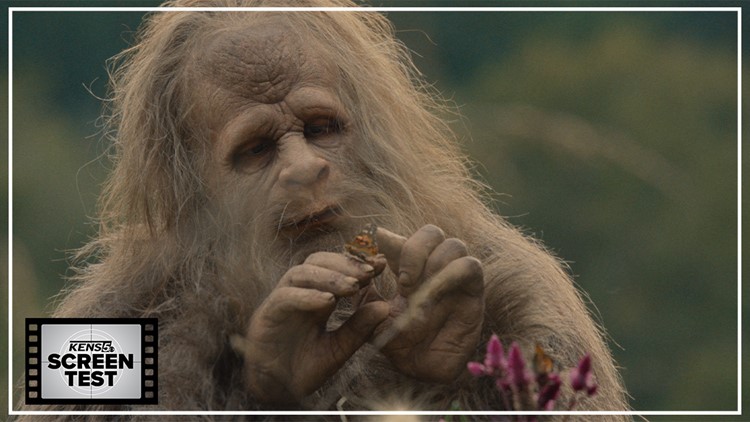TEXAS, USA — For all the ways that “Sasquatch Sunset” will make you squirm in your seat or regret eating less than 30 minutes before taking it, the indecent forest creatures at the center of this properly bizarre modern fable are nonetheless startlingly human in two respects: They honor their dead and they nurture new life.
So maybe that compassion comes naturally for any species, whether it’s the lumbering Sasquatches, the animals they appear able to communicate with, or the invisible humans whose footprint grows increasingly, devastatingly larger over the course of a year. But it leaves a potent impression – like briefly tripping into another artistic state of mind altogether – amid all the crotch-sniffing, poop-spouting, grunting, hissing and seething that more or less defines the life of a Sasquatch, as we come to see. How much are we willing to square the beauty of animalistic impulse with the grotesque way of being that our bigfoot-agonists embrace? “Sasquatch Sunset” initially seems like a trifle of an experiment by directors David and Nathan Zellner to maintain the relevancy of that question when the line is drawn with ample expenditures of bodily fluids.
But then something interesting happens. You start seeing souls under all the matted, impeccably curated hair. Pathos emerges in the gross-out humor and physicality of the performances. The movie’s observational approach starts to feel less like a nature mockumentary and more like emphasizing an isolation only we can admire. And the Sasquatches start connecting with their quaint mountainous land in ways that seem more human than human.
Such is the intriguing paradox of “Sasquatch Sunset,” a paradox strong enough to power its 89-minute runtime and strange enough to make you desperate to know what a turtle whispered to one of our four characters – hair-acters? – before being hurled away like a football.
That’s the most significant sign “Sasquatch Sunset” is after something more than wringing laughs or squeamish reactions out of us—it makes us wish we could see more of the world through the Sasquatches’ eyes, and encourages us to believe there’s something behind them we wouldn't expect. There are, in fact, many moments in the Zellners’ film where we might wish we could crawl into their minds when they make a new discovery or challenge the mostly peaceful, occasionally combative hierarchy they’ve carved out for themselves. When they find a manmade Bigfoot statue, do they think it’s a relative or a deity? When the alpha male is denied another chance to copulate with the only female of the group, is it because she’s merely tired or developing a sense of self-worth? Do those rotten berries they feast on actually taste better than the ripe ones that have been cautiously picked through?
David Zellner wrote “Sasquatch Sunset” while his brother slathered on the prosthetics as one of the creatures (joining him are Christophe Zajac-Denek along with, remarkably, Jesse Eisenberg and Riley Keough). Initially it seems like David is beckoning the audience to see ourselves reflected in the Sasquatches. Perhaps in the modern era we’re so glued to our screens that we have also become low-intelligence, the grunts and hisses exchanges for the clicks and clacks of virtual keyboards. Perhaps we’ve become so sequestered from the virtues of community that anything unrecognizable is liable to be treated with hostility. The Sasquatches come across a road splitting the woods and react by dousing it in excretion, only for any fear or anger to wilt away the very next scene; can we honestly say our attention spans are any longer?
Eventually the heart of the matter glints through the hefty Sasquatch costumes and dense forest sunlight: No, these Sasquatches aren’t meant to be a metaphor for humanity, but perhaps an ideal to aspire to if we can tune ourselves to a similar immediacy of life. As it stands, there's something boldly poignant about the movie telling us repeatedly that there's only so much we can know about these individuals; it isn't a matter of what there is to show, it's a matter of giving us permission to see it. Nothing everything is ours. Nothing everything has to be.
There are ways “Sasquatch Sunset” threatens to erode the sneaky sincerity under its ostensible ugliness; a pleasant acoustic score betrays the movie’s extremes with indie-ready uplift, for instance, and one can imagine how much more nimbly thematic terrain might have been explored if the Sasquatches’ proximity to humanity was established much earlier than it is. Still, for these marvelously disgusting and disgustingly marvelous Sasquatches, life is experienced by pure sensation. Any indication of feeling is notable (indications of art however, as one scene shows, are hilariously rejected). That includes the instinct of trying to carry on in the face of what may be cataclysm. This movie is birth, it’s life, it’s destruction. Yes, it’s cinema.
"Sasquatch Sunset" is rated R for some sexual content, full nudity and bloody images. It's in theaters now. Runtime: 1 hour, 29 minutes.
Starring Jesse Eisenberg, Riley Keough, Christophe Zajac-Denek, Nathan Zellner
Directed by David and Nathan Zellner, written by David Zellner
2024



